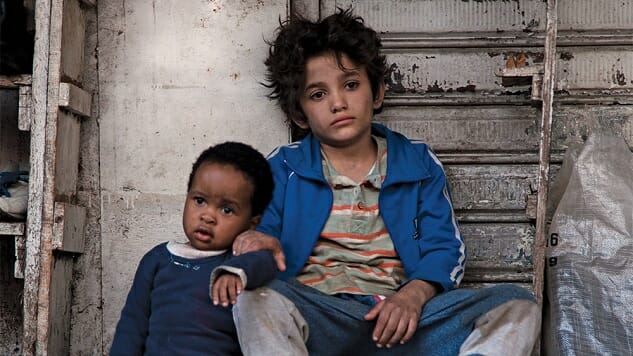Capernaum

Amazing that the phrase “one note” typically denotes work lacking depth; most people who only play one note can’t even hit the note right, much less give it dimension. Lebanese actress and filmmaker Nadine Labaki falls between these two poles. Her new movie, Capernaum, knows the note it’s trying to sustain, and knows how to keep the tune going. She’s a fine artist, but the relentless, unpleasant note she strikes goes on for far too long, with minimal reprieve from its misery and even less nuance to lend it more than a singular identity. Stick a bicycle pump in a Sally Struthers’ ChildFund commercials, hire Christopher Nolan to write the copy, then have Paul Greengrass shoot the thing, and that’s Capernaum in a nutshell: two hours of punishing poverty tourism that feels twice as long, only occasionally stopping briefly enough for its implications to sink in.
Part of the problem here is structural. Labaki bookends Capernaum, titled after the Israeli fishing village that serves as the setting for Jesus’s greatest miracles, with courtroom drama staged between 12-year-old Zain (Zain Al Rafeea) and his parents, mother Souad (Kawthar Al Haddad) and father Selim (Fadi Kamel Youssef), presented as heartless monsters who foist squalor and heap abuse upon their seemingly innumerable children. Zain’s on the stand for stabbing “a son of a bitch with a knife,” not a kids-say-the-darndest-things joke but a statement of fact: He’s really guilty of stabbing a man, though if it’s any consolation, the man’s a creep who lusts after and eventually marries Zain’s 11-year-old sister (Cedra Izam), and then worse. Hence the stabbing.
There’s more to Zain’s testimony. He’s suing mom and dad for the crime of bringing him into the world. This is an ingenious existential twist, almost unexpected but for the world-weary adult wisdom Zain has packed into his slight frame. When life forces you into adulthood before you’ve even reached your teens, you tend to grow up fast. He argues his case well. The trouble is that the courtroom melodrama clangs against the neo-realist bent Labaki adopts in telling the story of how he got from the Hell on earth of, apparently, Beirut into its legal system. Capernaum is in need of a brisk plot edit—it insists on getting in its own way.
Labaki’s filmmaking suggests uncertainty at best and lack of confidence at worst. She layers on the suffering too thick. Grant that Capernaum’s world isn’t built on compassion; more gauche than poverty tourism is poverty sentimentalism. Zain and his fellow castmates are non-professional actors. It’s possible, even probable, that the experiences captured by the film derive from experiences with which they’re familiar. Glazing over that with sugary artifice would deal greater insult to Capernaum’s reenactment of their realities than would its overemphasis of their realities.